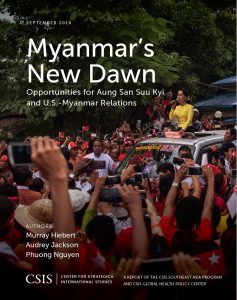Myanmar’s New Dawn :Opportunities for Aung San Suu Kyi and U.S.-Myanmar Relations
By Center for Strategic and International Studies • September 12, 2016 Five months after Aung San Suu Kyi and her National League for Democracy (NLD) swept to power in Myanmar in April following their stunning landslide victory in the November 2015 national elections, the new government is still very much in transition. Although the military that ran the country for 50 years did its best not to turn over the top slot to Aung San Suu Kyi, the country’s leading generals appear to be trying to prove they can play ball with the new largely civilian government.
Five months after Aung San Suu Kyi and her National League for Democracy (NLD) swept to power in Myanmar in April following their stunning landslide victory in the November 2015 national elections, the new government is still very much in transition. Although the military that ran the country for 50 years did its best not to turn over the top slot to Aung San Suu Kyi, the country’s leading generals appear to be trying to prove they can play ball with the new largely civilian government.
It will now be up to Aung San Suu Kyi to push forward the reforms that former president Thein Sein launched in 2011. The Myanmar she is leading today is a better place than it was six years ago when the military freed her from house arrest, launched peace talks with ethnic armed groups, and mounted tentative economic reforms. It is a much freer country that has expanded its foreign ties far beyond its one-time patron China, which the military junta heavily depended on for investment and military equipment.
The Center for Strategic and International Studies (CSIS) between May 29 and June 4 organized a delegation to Myanmar to evaluate the country’s political and economic
transition, the peace process with the country’s ethnic armed groups, the situation of
Muslims in Rakhine State, the health care system, and role of the United States in supporting reform and development. CSIS’s Southeast Asia Program and the Global Health Policy Center jointly organized the trip, which included several senior congressional staff.
Download full report here.
Tags: ASEAN, Aung San Suu Kyi, Center for Strategic and International Studies, Economy, National League for DemocracyThis post is in: ASEAN, Business and Human Rights, Economy, Environmental and Economic Justice, Health, Human Rights, International Relations, Law, Military Regime
Related PostsBurma Partnership Celebrates Continuing Regional Solidarity for Burma and Embraces the Work Ahead for Progressive Voice
Expanding People’ Solidarity for a Just and Inclusive ASEAN Community
Civil society launches #FreeThe5KH campaign in support of the imprisoned ADHOC staff and NEC official
Myanmar logging ban a major step to forest sector reform
Parliamentarians call for united front with civil society to fend off threats to democracy and human rights in Southeast Asia









 All posts
All posts